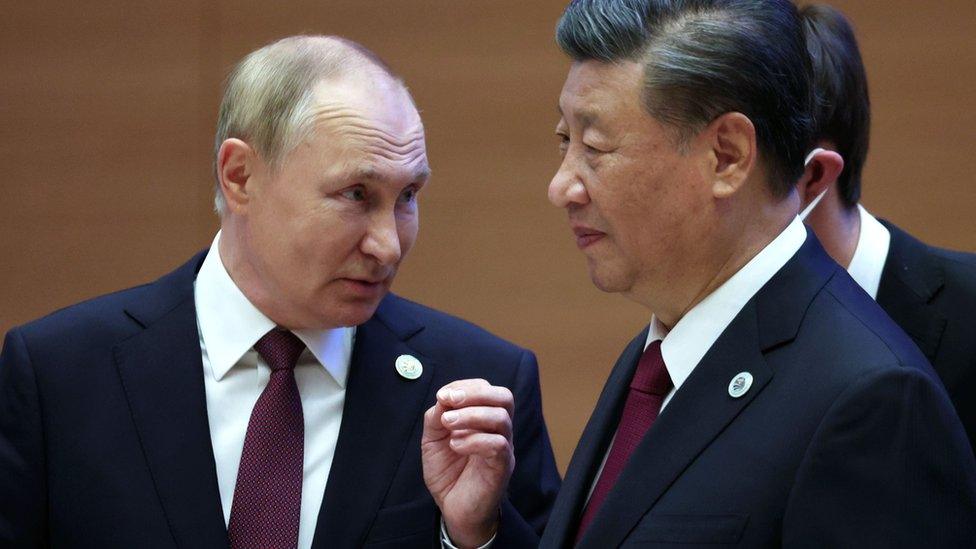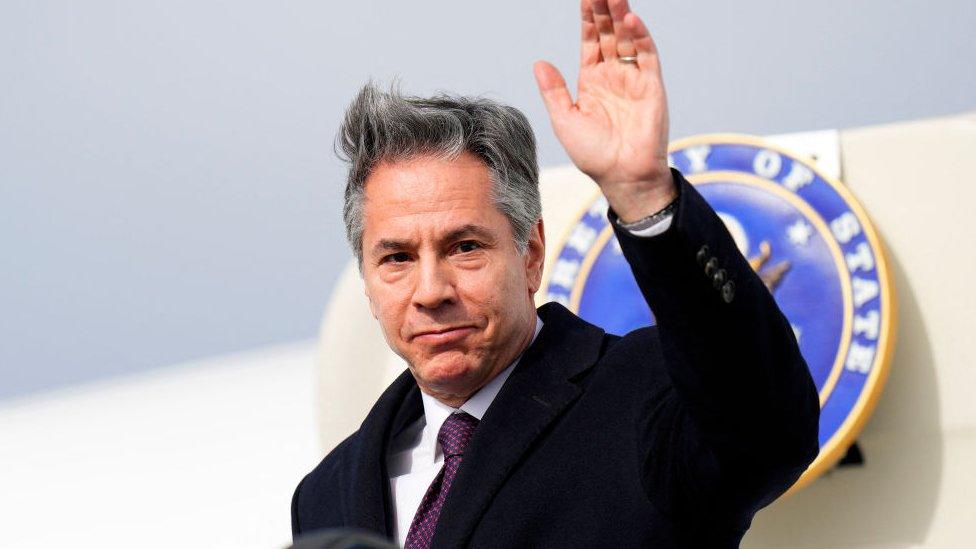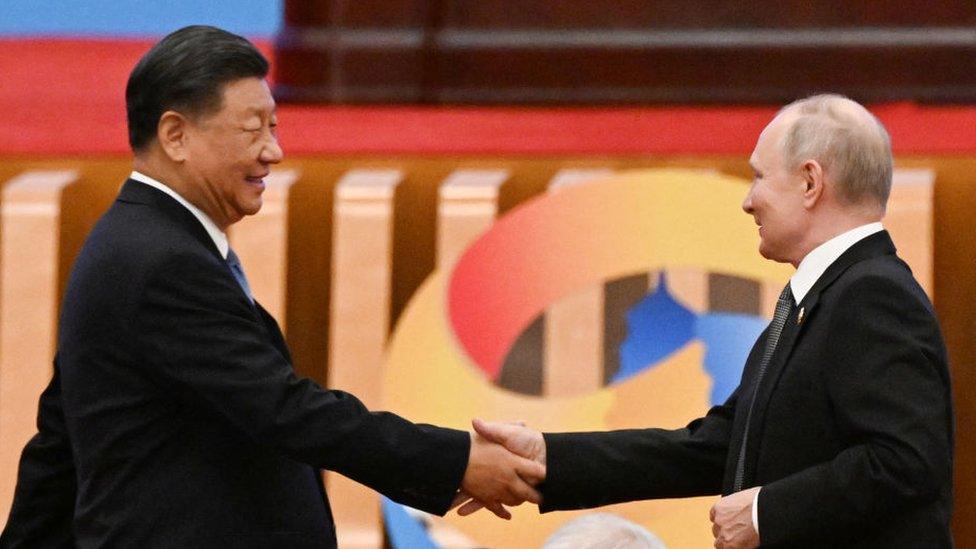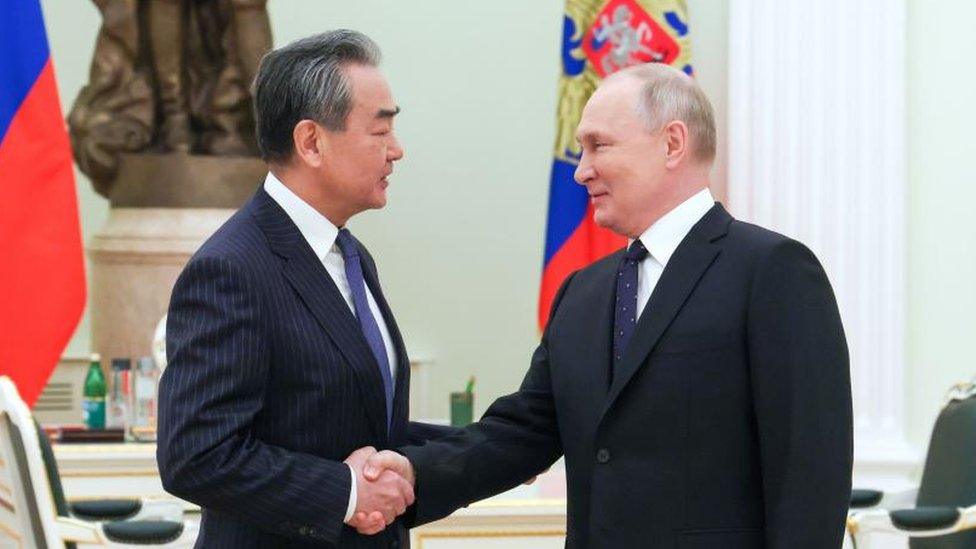Xi Putin meeting: What to expect from China-Russia talks
- Published

Vladimir Putin and Xi Jinping (pictured together last year) will meet for talks in Moscow this week
Chinese President Xi Jinping is embarking on his first trip to Russia since the country invaded Ukraine last year, and is set to sit down for talks with President Vladimir Putin.
Our Russia editor Steve Rosenberg and China correspondent Stephen McDonell have been considering what each side seeks to gain from the talks, and what we know about the relationship between the two countries.
Putin looking for help from a friend

Imagine you're Vladimir Putin.
You've started a war that hasn't gone to plan; you're up to your eyeballs in sanctions; and now the International Criminal Court has issued an arrest warrant for war crimes with your name on it.
It's at times like these you need a friend.
Enter Xi Jinping.
President Xi once called President Putin his "best friend". The two have much in common: they are both authoritarian leaders, and both embrace the idea of a "multi-polar world" devoid of US domination.
In Moscow they're expected to sign an agreement on "deepening the comprehensive partnership" between their two countries.
The Chinese president's state visit is a clear sign of support for Russia - and its president - at a time when the Kremlin is under intense international pressure.
And Russia's relationship with China is fundamental to withstanding that.
"Putin is building his own bloc. He doesn't trust the West anymore - and he never will again," believes journalist Dmitry Muratov, a Nobel Peace Prize laureate.
"So, Putin's looking for allies and trying to make Russia part of a common fortress with China, as well as with India, some parts of Latin America and Africa. Putin is building his anti-Western world."
In this "anti-Western world", Moscow is heavily reliant on Beijing - now more than ever, as the war rages in Ukraine.
"War has become the organising principle of Russian domestic politics, foreign policy and economic policy. There is an obsession with destroying Ukraine," concludes Alexander Gabuev, a senior fellow at the Carnegie Endowment for International Peace.
"For that you need arms, money and an economic lifeline. China provides Russia with, at least, components for arms, and civilian technology that can be used for military purposes. It definitely provides money."
To counter Western sanctions, and to shore up the Russian economy, Russia has been boosting trade with China, primarily in the energy sector. Expect oil, gas and energy pipelines to be on the agenda at the Putin-Xi talks.
But, once again, imagine you're Putin. One year ago you and Xi proclaimed that your partnership has "no limits". If that's really the case, might you expect China now to help you out in Ukraine, by supplying Russia with lethal aid and facilitating a military victory for Moscow? The US claims that China is considering doing just that. Beijing denies it.
As they say in Russia, "there's no harm wishing for something" - but it doesn't mean it's going to happen. If there's one thing the last year has shown it is that the "no-limits partnership" does have limits. Up to this point Beijing has apparently been reluctant to provide direct military assistance to Moscow, for fear of triggering secondary sanctions in the West against Chinese companies. As far as Beijing is concerned: sorry Russia… it's China first.
That very point was made very bluntly recently on a Russian state TV talk show.
"Ahead of President Xi's visit to Moscow, some experts here have been overexcited, elated even," noted military pundit Mikhail Khodarenok.
"But China can have only one ally: China itself. China can only have one set of interests: pro-Chinese ones. Chinese foreign policy is utterly devoid of altruism."
Xi's signals to Putin can only go three ways

Officially Xi Jinping's visit to Russia is to promote bilateral ties between two neighbours and certainly these governments say they are becoming ever closer.
There are agreements to be signed, meals to be had, photo opportunities to be staged.
All governments have such visits, so why all the attention on this one?
Well, for one, this is the leader of one of the world's two great superpowers visiting an ally - who happens to be the person who has unleashed a bloody invasion of another country in Europe - in 2023.
Many analysts have pondered what China might do if it looks like Russia is facing a clear, humiliating defeat on the battlefield.
The Chinese government says it is neutral. Would it just step back and let that happen, or start pumping in weapons to give the Russian army a better edge?
After Xi arrives in Moscow, he and his Russian counterpart may speak about other things, but all the attention will be on the Ukraine crisis.
His signals to Vladimir Putin can only go three ways:
1. Time to consider pulling back with some face-saving compromise
2. Green light to keep going or even go in harder
3. Nothing either way from China's leader
China is coming off the back of brokering a deal in which Iran and Saudi Arabia have re-established diplomatic relations. It is becoming ever more prepared to inject itself into matters way beyond its shores. This would seem to make option three unlikely.
With option one, if it involves Beijing again being able to claim the mantle of global peacemaker following the Iran-Saudi deal, this would be quite a neat feather in Xi's cap.
The main problem with that option is the extent to which it would also benefit China.
The bleakest of options is number two, but there is a reading whereby Russia's war with Ukraine plays into Beijing's geopolitical strategy. The Kremlin is taking on the West, eating up Nato resources and, the longer the war goes on, the more it tests the appetite of the Western public for yet more conflict if the People's Liberation Army should move to take Taiwan by force.
The calculation from Beijing could be that, the longer the war continues, the fewer people are going to want to get involved in another one.
The Chinese government's claim to neutrality also does not match the state-controlled news reporting here. The evening TV bulletins run the Kremlin line and devote a huge proportion of their coverage to blaming the "the West" for the "conflict". It doesn't speak about a "war" and would never dream of referring to an "invasion" of Ukraine.
Publicly, China says the sovereignty of all nations should be respected (ie Ukraine's), but so should the "legitimate security concerns" of other countries (ie Russia).
Yet it is not Kyiv where Xi Jinping is visiting. It's Moscow.
So, when Xi leaves Moscow in a few days, Putin will either be worried about wavering Chinese support or buoyed by the backing of one of the two most powerful people on the planet.
The smart money seems to be on the latter.
Related topics
- Published20 February 2023

- Published17 May 2024

- Published22 February 2023
